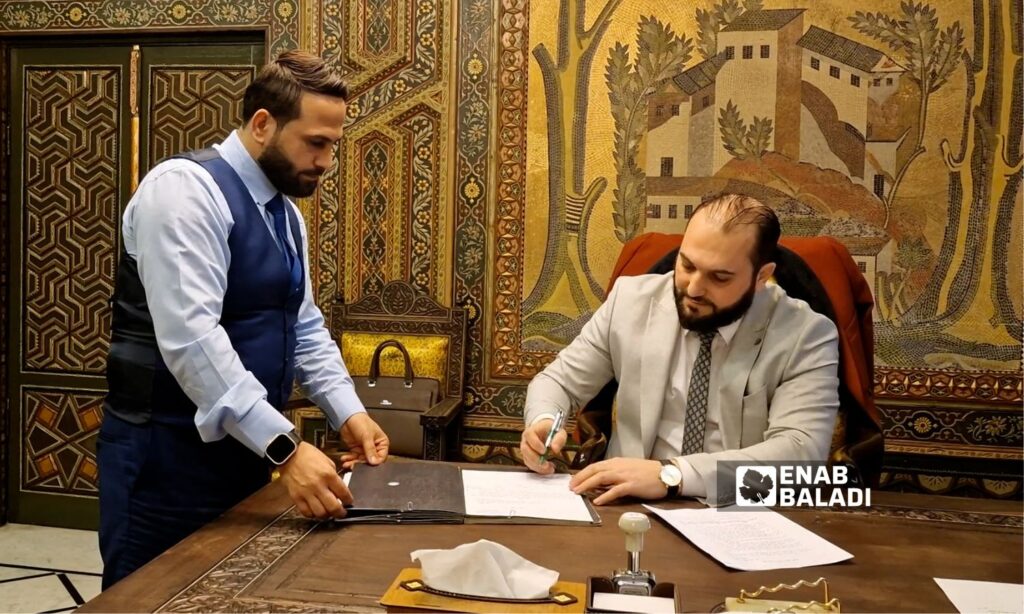The acting governor of Damascus, Maher Muhammad Marwan Idlibi, specified to Enab Baladi the priorities that the governorate is currently focusing on, explaining some of the issues related to land ownership, urban project regulations, transportation, and bread, as well as the methods being employed to address them.
He stated that the current priority is to ensure that most employees return to their institutions so that operations do not come to a halt. Over 95% of all institutions’ employees have resumed their work, along with efforts to restore necessary services such as cleaning, maintenance, road opening, police department activation, traffic police, bakeries, and more.
Idlibi added that the province has been working on regulating the numerical workforce of institutions, job descriptions, and assessing the actual needs in terms of numbers and descriptions so that the government can improve living standards by increasing employee salaries by 400%.
Regarding the areas that the Syrian regime has taken control of or problematic projects such as Marota City and Basilia City, the governor noted that these do not constitute government expropriation from a legal perspective.
He continued that all plots allocated to owners and rights holders will return to their rightful owners, but they are currently owned communally, adding that they will be distributed in a specific way until the organization work in these areas is completed.
He mentioned that he has tasked a specialized committee, in collaboration with both the previous and current administrative councils, with urban planning projects like Marota City and Basilia City alongside a new specialized team to address people’s problems and reach satisfactory results in the near term.
Regarding the high cost of bread and its mismatch with citizens’ financial capabilities, the governor noted that coordination has been made with the Grain Corporation to provide flour for bakeries. He pointed out that the actions of the ousted regime caused a crisis in this sector, both in terms of fuel and flour support.
He added that the previous approach was not economically balanced since flour support was provided without local investment, local industry, or other resources, leading to the economic structure deteriorating year after year and becoming overwhelmed with debt.
According to the previous mechanism in Syria, the government loses $600,000 daily due to flour support without compensating for these losses through other resources.
The governor stated that efforts are ongoing to provide flour at an acceptable price while raising employee salaries, securing investments, and utilizing other financial resources from the Ministry of Economy, and liberalizing the market for the private sector to operate in parallel with salary increases, so that living standards improve, and thus the price of bread aligns with citizens’ purchasing power.
On the issue of rising transportation costs and overcrowding in public transport in Damascus, Idlibi mentioned that the province has been working with the Transport Directorate to ensure the provision of transportation means and to double their number during this period. He attributed the rise in fares to the lack of fuel, as the ousted regime was importing fuel from Iran.
Currently, work is underway on international memorandums of understanding to import fuel, and resolving the situation in northeastern Syria soon will contribute to securing fuel and reducing transportation costs for citizens, according to the governor of Damascus.
On December 10, the General Command in Syria appointed Mohammed al-Bashir as the head of the caretaker government until March 2025, following the fall of the Syrian regime and Bashar al-Assad’s escape to Russia after a military operation led by opposition factions.
Maher Idlibi was appointed as the governor of Damascus and is a native of the city, having been displaced from it since 2011 due to the Syrian regime’s pursuit of him following peaceful demonstrations. He is a graduate of the Faculty of Sharia and Law at Idlib University, holds a professional project management certificate, and has worked in several institutions within the Syrian Salvation Government (SSG) that operated in Idlib.

